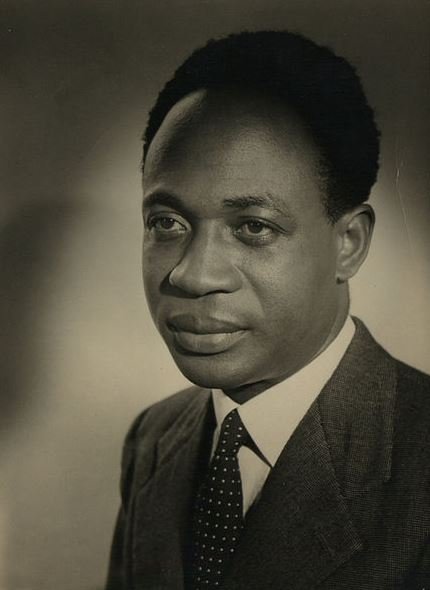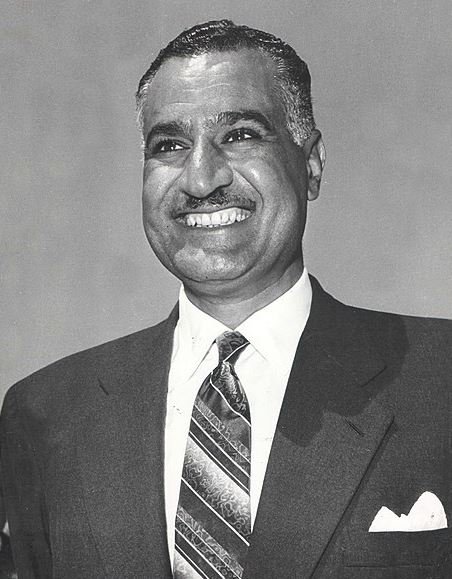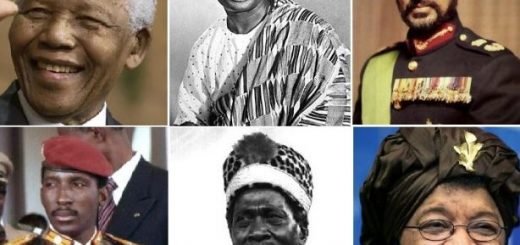9 Most Influential African Leaders of the 20th Century
The 20th century witnessed the rise of pivotal African leaders who played crucial roles in shaping the political landscape of their nations and the continent at large. Amidst the backdrop of decolonization, these leaders navigated paths toward independence and development, grappling with challenges posed by colonial legacies and global geopolitics.
From the iconic Nelson Mandela, who championed reconciliation and justice, to revolutionary figures like Thomas Sankara, advocating for self-reliance and social reform, each leader left a distinct imprint on their country’s history. Their diverse approaches and enduring legacies continue to influence discussions on leadership and governance in Africa today.
Below, World History Edu presents nine of the most influential African leaders of the 20th century, discussing their impacts, achievements, and the legacies they left behind:
1. Nelson Mandela (South Africa)
Nelson Mandela remains one of the most revered figures in world history, symbolizing the struggle against apartheid in South Africa. Spending 27 years in prison for his fight against racial oppression, Mandela’s release in 1990 marked the beginning of the end for apartheid. He was elected as South Africa’s first black president in 1994, fostering a new era of reconciliation and diversity. His leadership style, emphasizing forgiveness and collaboration, not only transformed South Africa but also inspired movements for freedom and justice worldwide.

Image: A 1994 photo of Mandela casting his vote.
2. Kwame Nkrumah (Ghana)
Kwame Nkrumah was a visionary leader who played a pivotal role in Ghana’s independence from British colonial rule in 1957, making Ghana the first sub-Saharan African country to gain independence. As the first Prime Minister and President of Ghana, Nkrumah was a staunch advocate for Pan-Africanism and played a significant role in the formation of the Organization of African Unity (OAU). His policies laid foundational stones for Ghana’s development and influenced anti-colonial movements across Africa.

Image: Kwame Nkrumah (1909 – 1972)
3. Julius Nyerere (Tanzania)
Julius Nyerere, known as Mwalimu or “teacher,” led Tanzania to independence in 1961 and served as its first president until 1985. Nyerere is celebrated for his commitment to African socialism as well as his efforts to unify the diverse linguistic and cultural groups within Tanzania under a single national identity. His Ujamaa policy—a form of African socialism—focused on rural development, communal living, and state ownership of the economy, though its economic success was mixed.

Image: A 1975 photo of Julius Nyerere
4. Patrice Lumumba (Congo)
Patrice Lumumba was the first Prime Minister of the independent Democratic Republic of the Congo (then called Zaire) in 1960. His tenure was short-lived but his impact on Congolese nationalism was profound. Lumumba is remembered for his passionate speeches and his vision for a unified, prosperous Congo free from colonial influence. His assassination in 1961, with the involvement of Western powers, marked a tragic chapter in African history, highlighting the Cold War’s impact on African politics.

Image: Patrice Lumumba (1925 – 1961)
5. Haile Selassie (Ethiopia)
Haile Selassie was the Emperor of Ethiopia from 1930 to 1974 and is often regarded as a messianic figure in Rastafarianism. His leadership during the Italian invasion in 1935 and his subsequent appeal to the League of Nations is a significant moment in world history, underlining the struggle of African nations against European imperialism. Selassie’s later years, however, were marred by famine and dissatisfaction, leading to his eventual overthrow.

Image: Haile Selassie in 1970
6. Jomo Kenyatta (Kenya)
Jomo Kenyatta was a leading figure in Kenya’s struggle for independence from British colonial rule. He became the first President of Kenya in 1964, serving until his death in 1978. Kenyatta’s leadership was pivotal in the establishment of a stable and economically viable Kenya, though his tenure also saw the consolidation of power that led to significant political and ethnic divisions that have influenced Kenyan politics deeply.

Revered as one of the greatest African leaders of the 20th century, Kenya’s first president Jomo Kenyatta contributed uniquely to the fabric of African political and social transformation. Image: A 1966 photo of Kenyatta.
7. Gamal Abdel Nasser (Egypt)
Though not sub-Saharan, Gamal Abdel Nasser was a pivotal figure in African and Middle Eastern politics. Coming to power after leading the overthrow of the monarchy in 1952, Nasser’s policies of Arab socialism and non-alignment were influential during the Cold War. His nationalization of the Suez Canal in 1956 marked a significant point in decolonization narratives and had a lasting impact on global geopolitics.

Image: A 1962 picture of Gamal Abdel Nasser
8. Thomas Sankara (Burkina Faso)
Thomas Sankara, known as the “African Che Guevara,” was the President of Burkina Faso from 1983 until his assassination in 1987. A Marxist and Pan-Africanist, he is remembered for his revolutionary programs for African self-reliance, his emphatic rejection of foreign aid, and his progressive policies in favor of women’s rights, education, and public health.
9. Samora Machel (Mozambique)
Samora Machel was the first President of Mozambique, steering the country towards independence from Portuguese colonial rule in 1975. A committed socialist, Machel’s leadership focused on eliminating illiteracy, improving health care, and promoting gender equality. His tragic death in a plane crash in 1986 marked the end of a significant era for Mozambique.

Image: Samora Machel (1933 – 1986)



























